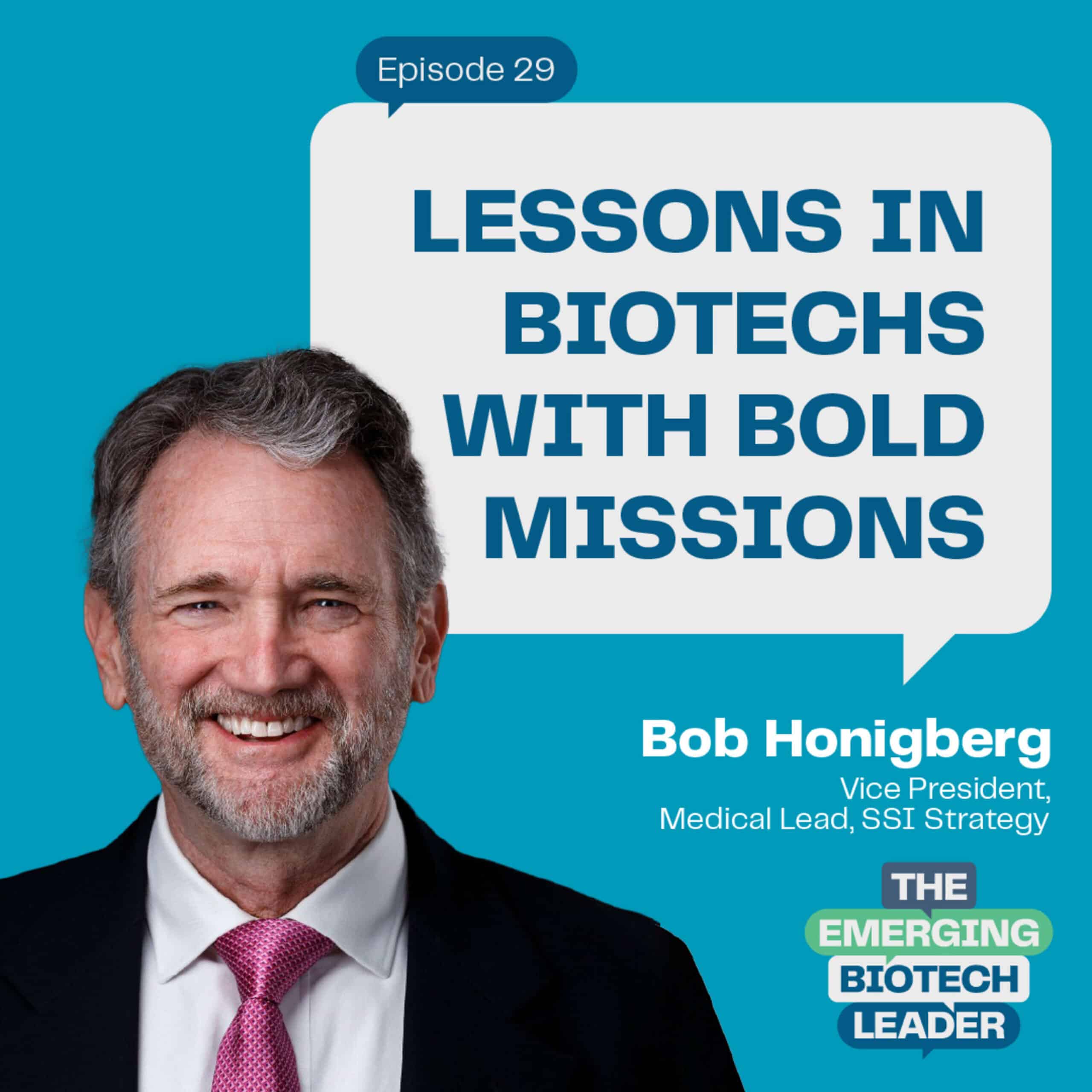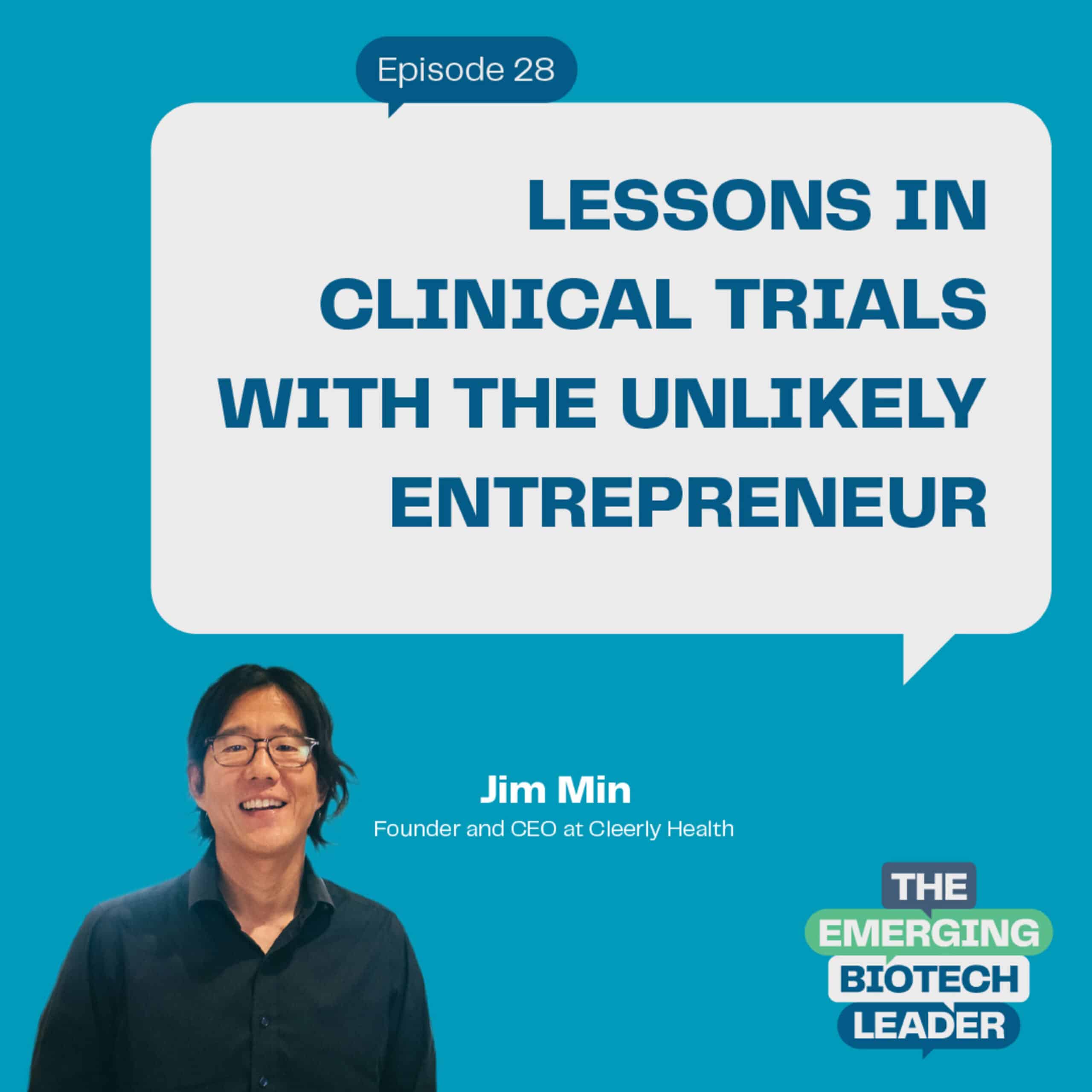
“You’re actually able to make a difference, not just at your local level or your regional level, but much more on a global level. You know, you may be one of the lucky few that is able to get involved in guideline development and those guidelines are then applicable across the world.’” Benit Maru, Senior Vice President, SSI Strategy
“Should I stay or should I go?” You might recognize those words as lyrics from The Clash; however, they also pertain to the decision to stay in academia or join the world of pharma and biotech. What happens when one leaves the sector and role they’ve known to carve out an entirely new career and skills in another?
This is precisely what Adam Schwartz, Ramin Farhood and Benit Maru discuss in this episode of the Emerging Biotech Leader—a follow up to Episode 21 featuring Victoria Nikklas, Chief Medical Officer at Oak Hill Bio.
All three members of the SSI team further examine the balancing act needed to transition from academia to industry, once again, acknowledging the misconceptions and impacts of ‘selling out.’
In case you are new to our show, Ramin Farhood is Sr. Vice President of Medical Affairs Practice at SSI and a regular staple and host of the Emerging Biotech Leader. Adam Schawrtz is President of SSI Strategy, guest hosting in Kim Kushner’s absence and Benit Maru is the European Lead and Medical SVP for SSI also serving as a Chief Medical Officer for SSI clients. Today, he’s our special guest expanding upon his 25 years in academia plus 7 more of his career recently spent in industry.
Formal introductions aside, let’s dig in to a few of the key concepts covered in this episode.
Those include:
- The benefits of going from academia to industry
- How ‘guarded optimism’ comes into play in developing new therapies
- Why the knowledge and expertise brought over from academia is essential for the success of the industry
- Reflections on CMOs and their delicate balance between science and business considerations
Embracing the Transition: From Academia to Biotech
Much like Victoria Niklas and other podcast guests who have transitioned from academia or bedside medicine to work in pharma and biotech, Benit, too, received his fair share of caution, stigma and discouragement.
“I was warned, you know, if you leave, you’re never going to be able to come back.”
As a byproduct, Adam and Benit hope this ongoing discussion reminds everyone that diverse experiences are the catalyst for long lasting change. When academics or practicing physicians bring their specific experience to industry, by way of career transition, it actually improves innovation which subsequently improves patient outcomes. Ramin weighed in on this as well.
“I’ve actually seen that individuals are really successful when they make the transition coming from academia and having been a research scientist. When coming into pharma, they become that voice. They almost bridge the industry and academia together in a very powerful and beneficial way for the patient.”
Keeping on this theme of patient impact, Adam probed to get more understanding from Benit on how to silence any guilt or self-doubt. Listen to the episode for his answer.
A big part in moving forward, that was available to Benit via hindsight, was how rewarding it was to experience an opportunity to expand beyond adult medicine to treatments in the pediatric sector.
Benit also went on to share: “It is a challenge to think I’m letting patients down by no longer treating them one to one. But, you know, in hindsight, you’re not letting them down because you’re going up a notch and you’re actually able to make a difference, not just at your local level or your regional level, but much more on a global level. You may be one of the lucky few that is able to get involved in guideline development and those guidelines are then applicable across the world.”
As a piece of transparency, he does disclose that missing patients is normal as you move into your new sector. Try to stay focused on the bigger cause.
Effective Communication for CMOs: Navigating Stakeholders and Challenges
Effective communication is another topic that finds its way into each Emerging Biotech leader episode. Timing, knowing your audience and delivery of communications in biotech are essential.
In her interview, Victoria Nikklas spoke to this need for ‘guarded optimism.’ In agreement, Benit also shares that those who have worked bedside before understand this really well.
“You kind of have to be really careful about what you say to a patient, that to me is a parallel where you think, ‘Okay, this is good. But I just need to be careful’ and that is kind of that ‘guarded optimism’ piece that Victoria mentioned.”
Adam expanded upon guarded optimism from his perspective, too.
“I feel like in medicine in general, and especially when you’re talking about developing new therapies, you have to be optimistic. Otherwise, you wouldn’t be thinking of these ideas. You wouldn’t be taking the steps to even try to get there if you weren’t optimistic about the idea. But at the same time, we have to be realistic, and we have to be understanding of what the limitations are. Make sure that you’re grounded in some reality, right? And waiting and taking the appropriate steps to test the science and prove things out before you’re sort of just running.”
This sparked the topic of CMOs needing to speak across multiple stakeholders, especially balancing science and business conversations.
Benit provided a few insights into how this was a struggle initially at the beginning of his career. “You know, how granular do you need to be? Too scientific? Not scientific enough? I think that’s one of the challenges of communication–knowing the audience and how to communicate.”
As a CMO, communication is one area where you can’t shy away from asking for help, which spurred another myth Benit wants to debunk–that asking for help “looks bad.” To further make the case for transferable skills and relevant experiences from academia to industry, Benit shared, “Somebody that’s actually got quite a good tenure in medicine and academia, they’re comfortable in asking for help when needed.”
To provide further encouragement, Adam reminds our listeners: “You need to be able to rely on a team around you because no CMO is going to be great at everything that is part of their responsibilities.”
What causes this false belief? The misconception and pressures of “needing to know all the answers.” Adam, Ramin and Benit dive deeper into managing this form of imposter syndrome further. Keep your ears opened for that topic.
On Fostering Growth and Adaptability in the Biotech Industry
The topic of communication inspired yet another theme: confidence. Only in this case, having the confidence to reach out to others–peers, your network, your team, whomever can help close knowledge and skills gaps.
It’s one thing to acknowledge you need and want help and another to put that into practice. To help instill just how important this is, Benit shared, “I think CMOs fail because they’re too scared to do that for whatever reason.”
Ramin weighed in with a real-world story of asking for help from his career.
“I remember when we had to go to the board and this was a practice that we learned. I mean, you always learn by your mistakes, right? We finally got ahead of it and we asked the CEO, ‘Well, what is the board interested in? What do they want to know about this study? What are some of the thoughts?’ We were not in daily communication with the board, but the CEO was, and that helped us quite a bit to prepare. And as simple as it sounds, it’s something that we don’t do enough of because we are busy. It’s not like we don’t think of it, but we are busy until the day of the presentation or the investor meeting or whatever the case will be, but the practice makes such a big difference.”
As another practice in communication, growth and asking for help, Adam encourages the adoption of a stakeholder management strategy.
“Who do I need to message to? What information am I messaging to them? Thinking through that entire approach so you could have the key things that we’re going to need to regularly be communicating to the board, to the rest of the C-suite, to the team, to the rest of the organization, to advocacy organizations, to other external stakeholders, to investors, are examples of this, right?
You could map all of those things out and be thinking about what granularity and level of data you need. I think we do that informally in many different ways. But I really haven’t seen a medical team doing that in a very robust way outside of maybe medical affairs where it’s a very communications focused orientation.”
When it comes to succeeding as a CMO, Adam, Ramin and Benit had even more to share on time management and delegation, in addition to asking for feedback from the team and peers as well.
While the CMO is already knowledgeable and experienced, continuous learning, open-mindedness, and embracing new perspectives were identified as the keys to personal growth and development. To pick up their additional input and suggestions, hit that play button for the Episode.
As we bid you goodbye until the next guest, we have these final words of encouragement. Keep exploring, innovating, and leading the way towards a better future in the emerging biotech landscape.
Never miss an episode! Subscribe to the Emerging Biotech Leader today. As a bonus-we’d appreciate your review of our show.


